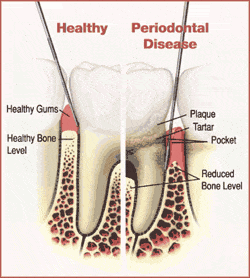Periodontal Care
Gum disease is a national epidemic. 90% of the population has some degree, a moderate or advanced infection that destroys the gums and surrounding bone. Untreated gum disease has been proven to dramatically increase heart disease, stroke and respiratory infections. In addition, pregnant mothers with gum disease are at risk for premature and low birth-weight babies.
Never before have so many treatment options been available to treat Periodontal Disease. The use of laser, antimicrobials, and individualized patient education, place our patients in the best position to keep ther teeth for life.
Gum Disease Treatment Is Important for Total Health
Until recently, periodontitis (gum disease) was considered to be only a dental problem with little or no effect on our overall health and well-being. However, recent research shows that this is not true. Periodontal disease can seriously affect the heart and has been shown to contribute to heart disease, as well as other disorders.
Periodontal disease is a serious infection caused by plaque bacteria. Although most of the bacteria are confined to the pockets around the teeth, they can invade the gum tissue and enter the bloodstream, circulating throughout the body.
When you come to our office for a complete examination, we will include a thorough periodontal evaluation. This is a service you should insist on. How much value is there to have us create a beautiful smile, for example, only to lose your teeth prematurely to gum disease? If we want our work to last, we have to give high priority to the health of your gums.
Symptoms of Gum Disease
The problem with gum disease is that most symptoms don’t appear until it’s too late to treat it. Common symptoms are:
- Teeth shifting in position
- Teeth becoming loose
- Gum recession
- Drainage coming from around a tooth
But if you wait until these symptoms appear, you’re at high risk of losing your teeth. That’s why a periodontal examination is so important and why Dr. Rader feels strongly about providing this service to you. Too often, people don’t know they have serious periodontitis until it’s too late.
Bleeding gums are a symptom that some people experience, and this will occur in gingivitis, which is an early stage of gum disease. Your gums aren’t supposed to bleed, and if this occurs, it generally indicates that the teeth aren’t being cleaned properly.
Gingivitis

Gingivitis is simply an inflammation of the gums. It is superficial, and is the first stage of gum disease. Treatment is simple, and involves your basic dental cleaning and good home care including brushing and flossing daily.
Periodontitis

Periodontitis is gum disease that has progressed beyond superficial inflammation of the soft tissues and has begun to involve the bone. In periodontitis, there is destruction of the bony support of the teeth. If it is caught early (early periodontitis) treatment is relatively simple, and usually involves only deep cleaning and possibly more frequent regular maintenance.
In advanced periodontitis, teeth are loose and may have begun to fall out already.
Treatment of gum disease
Traditional treatment for periodontitis involves “scaling and root planing”, which is about as unpleasant as it sounds. A dental hygienist usually performs scaling and root planing with hand instruments to remove calculus. Calculus is a hard deposit on your teeth that occurs both above and below the gumline and is an irritant that leads to infection and bone loss. But scaling and root planing doesn’t remove the biofilm that houses the bacteria, so its effectiveness is limited.
The most advanced technology available in modern dentistry to treat periodontitis is to use micro-ultrasonic instruments and lasers. This combination of technologies actually eliminates the infection rather than managing periodontal disease. A special laser is used to sterilize the periodontal pockets and remove any infected tissue. As the old tissue is removed the body’s natural healing response takes over. The formerly infected tissue reattaches to the bone and the gums return to a healthy, infection-free state. The laser is specifically designed to seek out periodontal infection and does not harm the teeth or other healthy tissue. This is one of the amazing characteristics of lasers. The hygienist calibrates the laser to provide just the right amount of power to treat your gums without causing undue pain or trauma to the tissue. Periodontal laser therapy actually removes the infection and the cost is significantly less than other alternatives that might eventually result in surgery.
Allow us to help you determine the best treatments for your individual needs and desires. One thing we know for certain: you can have a gorgeous smile.







